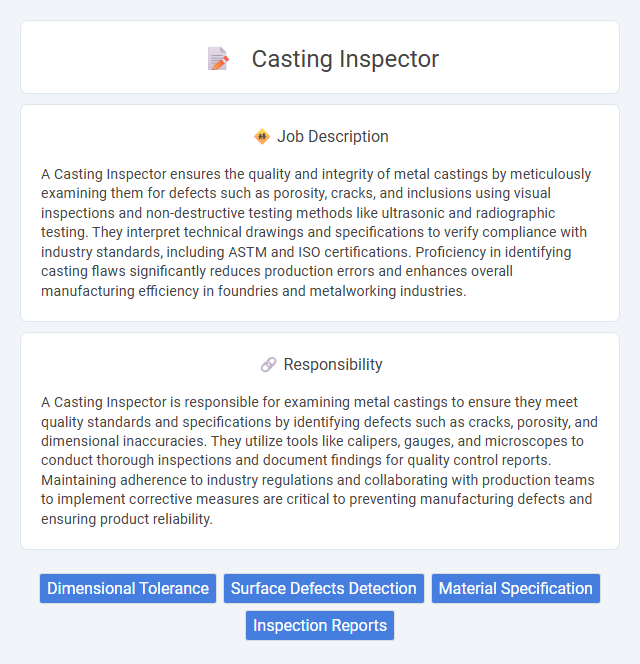
A Casting Inspector ensures the quality and integrity of metal castings by meticulously examining them for defects such as porosity, cracks, and inclusions using visual inspections and non-destructive testing methods like ultrasonic and radiographic testing. They interpret technical drawings and specifications to verify compliance with industry standards, including ASTM and ISO certifications. Proficiency in identifying casting flaws significantly reduces production errors and enhances overall manufacturing efficiency in foundries and metalworking industries.
Individuals with a keen eye for detail and strong analytical skills are likely to be well-suited for a casting inspector role, as the job involves identifying defects and ensuring quality standards in cast products. Those who can maintain focus in potentially repetitive tasks and work in industrial environments may find the conditions favorable, though individuals sensitive to noise or requiring a completely clean workplace might face challenges. Physical stamina and an ability to work with precision under varying temperatures could influence suitability for this position.
Qualification
A Casting Inspector must possess a deep understanding of metallurgy and foundry processes, along with proficiency in interpreting technical drawings and specifications. Essential qualifications include a degree or diploma in materials engineering, metallurgy, or a related field, combined with hands-on experience in casting defect identification, quality control, and nondestructive testing techniques. Strong analytical skills and familiarity with industry standards such as ASTM and ISO are critical for ensuring compliance and maintaining the integrity of cast components.
Responsibility
A Casting Inspector is responsible for examining metal castings to ensure they meet quality standards and specifications by identifying defects such as cracks, porosity, and dimensional inaccuracies. They utilize tools like calipers, gauges, and microscopes to conduct thorough inspections and document findings for quality control reports. Maintaining adherence to industry regulations and collaborating with production teams to implement corrective measures are critical to preventing manufacturing defects and ensuring product reliability.
Benefit
A Casting Inspector will likely enjoy benefits such as a competitive salary and opportunities for career advancement within manufacturing or foundry industries. They might also experience enhanced job security due to the critical role they play in ensuring product quality and compliance with industry standards. Access to continuous training and professional development programs could further improve their expertise and job satisfaction.
Challenge
Casting inspectors likely face the challenge of maintaining strict quality control under tight production schedules, which demands keen attention to detail and rapid decision-making. The probability of encountering unexpected defects or material inconsistencies requires them to quickly assess and address issues to prevent costly delays. Balancing precision with efficiency may prove difficult, as errors can significantly impact both safety and product performance.
Career Advancement
Casting inspectors play a crucial role in ensuring product quality by identifying defects in metal castings through detailed examination and testing. Mastery in metallurgical analysis and defect recognition positions casting inspectors for advancement into quality control management or process engineering roles. Gaining certifications such as NDT (Non-Destructive Testing) and experience with industry standards like ASTM enhances career prospects and salary potential within manufacturing and foundry environments.
Key Terms
Dimensional Tolerance
A Casting Inspector ensures the dimensional tolerance of metal castings meets specified industry standards by conducting precision measurements using gauges, calipers, and coordinate measuring machines (CMM). Accurate verification of dimensional tolerances prevents defects, reduces material waste, and ensures the casting fits correctly within mechanical assemblies. Mastery of interpreting engineering blueprints and adherence to ISO or ASTM casting quality guidelines is essential for maintaining product integrity.
Surface Defects Detection
Casting inspectors specialize in the identification and evaluation of surface defects such as cracks, porosity, and inclusions during the metal casting process. They utilize advanced techniques like visual inspection, magnetic particle testing, and ultrasonic testing to ensure product quality and compliance with industry standards. Precision in detecting surface defects is critical to preventing structural failures and maintaining the integrity of cast metal components.
Material Specification
Casting inspectors ensure cast components meet stringent material specifications, including alloy composition, grain structure, and hardness requirements. They apply advanced nondestructive testing methods and metallurgical analysis to verify that materials conform to industry standards such as ASTM, SAE, or ISO. Maintaining quality control throughout the casting process reduces defects and guarantees optimal performance in critical applications.
Inspection Reports
Casting inspectors play a critical role in quality assurance by meticulously examining metal castings for defects such as porosity, cracks, and dimensional inconsistencies. Inspection reports generated by casting inspectors document detailed findings, including measurements against specifications, non-conformities, and suggested corrective actions to ensure compliance with industry standards like ASTM and ISO. These reports serve as essential records for traceability, enabling manufacturers to maintain product integrity and facilitate continuous improvement in casting processes.
 kuljobs.com
kuljobs.com